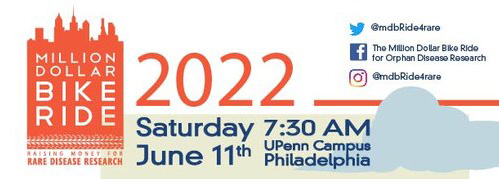TWO NEW SETBP1 RESEARCH PROJECTS FUNDED THROUGH 2022 MILLION DOLLAR BIKE RIDE GRANTS
For the 4th year in a row, our SETBP1Strong Team participated in the Million Dollar Bike Ride MDBR) in Philadelphia, PA in June of 2022. This annual event supports over 30 rare disease communities and is sponsored by the Penn Medicine Orphan Disease Center (ODC). Collectively, the 2022 event raised over $2.6 million for the 37 pilot grants funded. The ODC secures philanthropic donations that are used to match, dollar for dollar, the funds raised by each of the cyclist teams. Our 2022 MDBR SETBP1Strong Team raised $91,644. The following researchers were awarded the 2 SETBP1Strong grants.
Grant Awardee 1



2022 Million Dollar Bike Ride SETBP1 Disorder Research Grant
$45,832 for 1 year
SETBP1 haploinsufficiency disorder is a rare disorder caused by DNA changes that lead to a decreased amount of the SETBP1 protein. Individuals with SETBP1 haploinsufficiency disorder show expressive speech impairment, mild-moderate developmental delays, and a range of additional symptoms. To date, we still know little about how the SETBP1 protein works, and why insufficient amounts of this protein affect the human brain, leading to a disorder. Our research aims to study the molecular and cellular pathways that are altered in SETBP1-haploinsufficiency disorder, and for understanding how these relate to the clinical features of patients, using extensive informative tools including stem cells and brain organoids that we have already established in the laboratory. Ultimately, we hope that analyses of SETBP1 (dys)function in the laboratory can advance fundamental understandings of SETBP1 functions during brain development and help towards therapeutic development for the disorder.
Grant Awardee 2

2022 Million Dollar Bike Ride SETBP1 Disorder Research Grant
$45,832 for 1 year
SETBP1-HD is a rare neurological disorder caused by insufficient levels of SETBP1 protein. The aim of this grant is to explore the potential to restore levels of SETBP1 through two different approaches. The first approach will aim to deliver SETBP1 protein into the brain using a novel delivery system that can function as a “keycard” to the brain. The second approach would use the CRISPR technology to increase the level of SETBP1 protein being made from the remaining copy of the gene. Both technologies will use the “keycard” delivery technology. The work will be done in human cells. If successful this could represent a potential therapeutic strategy for SETBP1-HD.
View 2022 Million Dollar Bike Ride Grant Application Program
